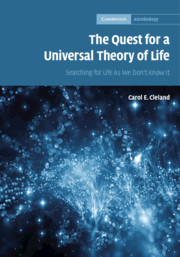Book contents
- The Quest for a Universal Theory of Life
- Reviews
- Cambridge Astrobiology
- The Quest for a Universal Theory of Life
- Copyright page
- Dedication
- Contents
- Acknowledgments
- Introduction
- 1 The Enduring Legacy of Aristotle: The Battle over Life as Self-Organization or (Genetic-Based) Reproduction
- 2 Why Life Cannot Be Defined
- 3 What Is a Scientific Theory?
- 4 How Scientific Theories Develop
- 5 Challenges for a Universal Theory of Life
- 6 Rethinking the Traditional Paradigm for Life: Lessons from the World of Microbes
- 7 Artificial Life: Could ALife Solve the N = 1N=1 Problem?
- 8 Searching for Extraterrestrial Life Without a Definition or Universal Theory of Life
- 9 A Shadow Biosphere: Alien Microbes on Earth?
- Conclusion
- References
- Index
3 - What Is a Scientific Theory?
Published online by Cambridge University Press: 05 September 2019
- The Quest for a Universal Theory of Life
- Reviews
- Cambridge Astrobiology
- The Quest for a Universal Theory of Life
- Copyright page
- Dedication
- Contents
- Acknowledgments
- Introduction
- 1 The Enduring Legacy of Aristotle: The Battle over Life as Self-Organization or (Genetic-Based) Reproduction
- 2 Why Life Cannot Be Defined
- 3 What Is a Scientific Theory?
- 4 How Scientific Theories Develop
- 5 Challenges for a Universal Theory of Life
- 6 Rethinking the Traditional Paradigm for Life: Lessons from the World of Microbes
- 7 Artificial Life: Could ALife Solve the N = 1N=1 Problem?
- 8 Searching for Extraterrestrial Life Without a Definition or Universal Theory of Life
- 9 A Shadow Biosphere: Alien Microbes on Earth?
- Conclusion
- References
- Index
Summary
Not everyone who advances a so-called definition of life has in mind the traditional notion of definition. This is especially true of scientists. Biochemist Steve Benner (2010), for instance, contends that definitions encapsulate theories, and speaks of the need for formulating a “definition-theory of life” (p. 1022). But it is also true of some philosophers who are well aware of the limitations of traditional definitions. As an illustration, Mark Bedau (1998) presents a “definition” (his term) for life and characterizes it as the “general form of my theory of life” (p. 128). Definitions of this sort are nonstandard in the sense that their authority does not derive from analysis of human concepts or alternatively mere stipulations of meaning. Their acceptability depends upon successful empirical investigations. Nonstandard definitions nonetheless resemble traditional definitions structurally insofar as they supply necessary and sufficient conditions (identifying descriptions) for membership in a presumed natural kind. Some recent proposals for “defining” life, briefly discussed in Section 3.5, are even more radical, rejecting the received view that a central function of definition is classification; on such a proposal, a definition of life need not even provide necessary and sufficient conditions for life.
- Type
- Chapter
- Information
- The Quest for a Universal Theory of LifeSearching for Life As We Don't Know It, pp. 63 - 81Publisher: Cambridge University PressPrint publication year: 2019



